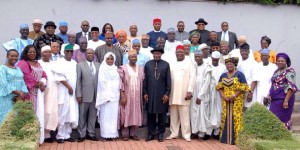Oil
President Jonathan blames Nigeria’s fuel scarcity on sabotage
By Yemie ADEOYE & Joseph BAMIDELE
HOUSTON Tx-NIGERIA’s outgoing President Goodluck Jonathan has blamed the recent petroleum scarcity which brought the nations economy to its knees on sabotage, even as he refrained from exposing the person or group that may be responsible for the terrible act.
This is coming just as he also called on the incoming government of Gen. Muhammadu Buhari not to single out the outgoing government which he led for a probe but extend the probe to other governments before his.
The President spoke at the valedictory session of the Federal Executive Council monitored by our reporter in Abuja ahead of his handing over to Gen. Muhammadu Buhari on Friday, May 29th.
“Even this last fuel scarcity issue, to me, one can clearly say it was an act of sabotage. This government has few days to go and that is definitely not the time you should expect massive strikes, using marketers and unions, who are asking for increase in salaries at a time oil price and volumes have dropped.
None of the international oil companies (IOCs) is increasing salaries but our unions wanted 11 per cent increase in allowances and so on and then, they went on strike. “We had products in our reserve that will last 21 days, so it is not as if we had no products. They just refused to lift.
Diesel was deregulated long ago, so the issue was not the product but people who felt they must bring this government to its knees even when they know that we had few days to leave. But we thank God we are getting over it and God will see us through,” the president prayed.
While expressing appreciation to members of the council for their various contributions to his administration, President Jonathan said he was satisfied with the performance of all the ministers. “One thing is clear, I enjoyed working with all of you. I’m very pleased with all of you. I want to thank all of you for your various contributions to the development of our country.
I want to thank those that have been with us, the Advisers, Senior Special Assistants, the secretariat, other senior government functionaries, including the media that covered proceedings every Wednesday. “As a cabinet, we have tried our best, I believe we have done well under a very difficult situation. There are a lot of criticisms, people say different things at different times, some of those who make some statements know they are purely political,
” he noted. He said the involvement of the ministers in his administration was not a waste as they all contributed in a way to move the country forward. Earlier, all the ministers took turn to speak on their experiences in the cabinet.
Cabinet members react Minister of Defence, General Aliyu Gusau, who was the National Security Adviser when Jonathan took over after the death of Umaru Yar’Adua commended the President for being a humane and kind hearted person and predicted that, like former President Olusegun Obasanjo and General Muhammadu Buhari, who left office as military heads of state and came back again, President Jonathan may also come back to office after four years.
The ministers eulogised President Jonathan for taking the bold decision to concede defeat even before the results were fully collated. Senator Musiliu Obanikoro in his speech noted that “all the achievements that this administration recorded would have come to nought but for the singular call you made to the president-elect while the votes were being tabulated”.
President Jonathan, however noted that contrary to popular expectation, he was not dissolving the cabinet and directed all ministers to remain on their seats and attend the hand-over dinner scheduled for this night in their official capacities as ministers of the federal republic.
Oil
NNPC Targets 60% Methane Emission Reduction By 2031
The Nigerian National Petroleum Company Limited (NNPC) has unveiled a bold strategy to reduce methane emissions in the oil and gas sector by 60% by 2031, with an ultimate goal of achieving net-zero emissions by 2060.
This announcement reinforces Nigeria’s leadership role under the Global Methane Pledge initiative and its commitment to tackling climate change.
The Group Chief Executive Officer of NNPC, Mele Kyari, disclosed these plans during a meeting on Thursday with Robert Leahman, the U.S. State Department’s Global Methane Program Manager, and a delegation from Deloitte.
READ MORE: Atiku Gloats Over AUN’s Achievements Ahead Of 20th Anniversary
The discussions, held at the NNPC Towers in Abuja, focused on collaborative efforts to reduce methane emissions through innovative and sustainable practices.
“Reducing methane emissions is not just an environmental necessity but also a strategic imperative for Nigeria’s energy transition. We are leveraging partnerships to adopt global best practices and innovative solutions,” Kyari stated.
Key among these efforts is a pilot project in the Niger Delta, aimed at establishing emissions baselines, mitigating methane leaks, and promoting sustainable operations across Nigeria’s energy sector.
The project, a partnership between NNPC, Deloitte, and the U.S. Bureau of Energy Resources, will utilize data-driven methodologies to pinpoint and address methane hotspots.
Robert Leahman commended Nigeria’s proactive stance, describing it as a benchmark for other nations on the continent.
“Nigeria’s leadership under the Global Methane Pledge sets a standard for the continent. These initiatives will not only help reduce emissions but also drive sustainable development in the energy sector,” he said.
Kyari highlighted the broader benefits of addressing methane emissions, noting its significance for both environmental protection and economic efficiency.
“This collaboration is a game-changer. By addressing methane leaks, we’re reducing waste, saving costs, and protecting the environment. It’s a win-win for our economy and the planet,” he added.
Oil
FG Introduces New Incentives To Revitalize Nigeria’s Oil & Gas Industry
In a strategic move to revitalize Nigeria’s oil and gas sector, the Federal Government has unveiled two key fiscal incentives aimed at attracting investment and enhancing energy security.
The announcement was made by Mr. Wale Edun, the Minister of Finance and Coordinating Minister of the Economy on Wednesday.
The first initiative, the Value Added Tax (VAT) Modification Order 2024, introduces critical exemptions for essential energy products and infrastructure, including Diesel, Feed Gas, Liquefied Petroleum Gas (LPG), Compressed Natural Gas (CNG), Electric Vehicles, Liquefied Natural Gas (LNG) infrastructure, and Clean Cooking Equipment.
Read Also: Atiku Calls For Rotational Presidency Across Nigeria’s Geopolitical Zones
These exemptions are designed to reduce living costs for Nigerians, promote energy security, and accelerate the transition to cleaner energy alternatives.
The second initiative, the Notice of Tax Incentives for Deep Offshore Oil & Gas Production, offers new tax relief options for deep offshore exploration projects.
This measure aims to position Nigeria’s deep offshore basin as a premier destination for international oil and gas investments, boosting the country’s appeal to foreign investors.
These reforms are part of a broader set of policy initiatives, known as Policy Directives 40-42, endorsed by President Bola Ahmed Tinubu.
The directives reflect the administration’s commitment to fostering sustainable development in the energy sector and enhancing Nigeria’s competitive edge in the global oil and gas market.
Business
Tinubu set to approve ExxonMobil-Seplat oil deal, expands CNG bus initiative

By Yemie Adeoye
NIGERIA’s President Bola Tinubu has announced that the protracted ExxonMobil-Seplat upstream oil divestment will be formally approved by the Minister of petroleum within a matter of days, just as he announced his government’s intention to expand the Compress natural Gas, CNG buses initiative.
The President who stated this during his Independence day nationwide broadcast stated that the move is in line with his administration’s commitment to free enterprise, free entry and free exit in investments which is the hallmark of his administration investment policy.
“Fellow compatriots, our administration is committed to free enterprise, free entry, and free exit in investments while maintaining the sanctity and efficacy of our regulatory processes. This principle guides the divestment transactions in our upstream petroleum sector, where we are committed to changing the fortune positively. As such, the ExxonMobil Seplat divestment will receive ministerial approval in a matter of days, having been concluded by the regulator, NUPRC, in line with the Petroleum Industry Act, PIA. This was done in the same manner as other qualified divestments approved in the sector.”
The President also seized the opportunity to plead with Nigerians to be patient with his administration’s reform policies. “As your President, I assure you that we are committed to finding sustainable solutions to alleviate the suffering of our citizens. Once again, I plead for your patience as the reforms we are implementing show positive signs, and we are beginning to see light at the end of the tunnel”.
“Our energy transition programme is on course. We are expanding the adoption of the Presidential Initiative on Compressed Natural Gas for mass transit with private sector players. The Federal Government is ready to assist the thirty-six States and FCT in acquiring CNG buses for cheaper public transportation.
Fellow Nigerians, while we are working to stabilise the economy and secure the country, we also seek to foster national unity and build social harmony and cohesion. Our economy can only thrive when there is peace”. he enthused.






















